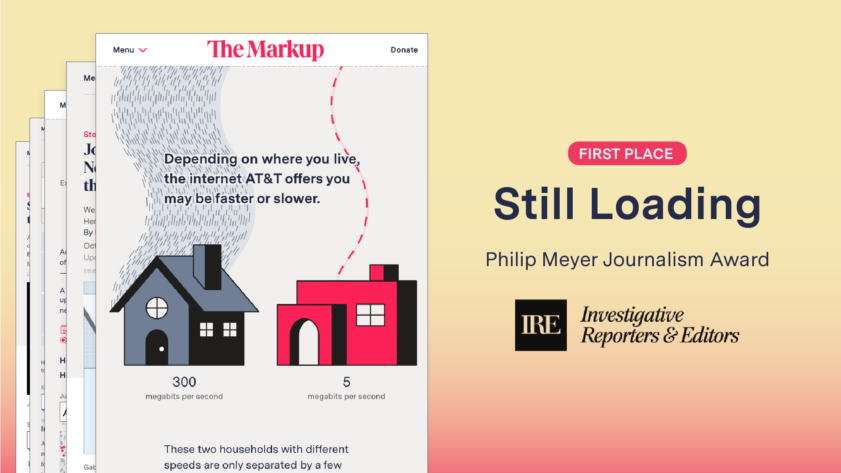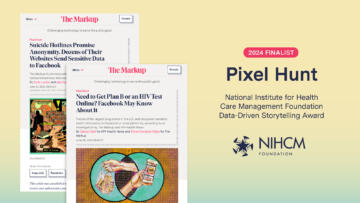The Markup’s investigative series on vast internet disparities in the United States, “Still Loading,” has won first place in the Philip Meyer Journalism Award, which recognizes the best uses of social science research methods in journalism.
Judges said the series tells “a powerful story about a critical social injustice” and that they “applaud the team for their resourcefulness, robust validation process and, along with their partner Big Local News, commitment to sharing their bespoke mapping tool with the public.”

Still Loading
FCC Approves Rules to Prevent ‘Digital Discrimination’
Congress tasked the FCC with closing the digital divide. Here’s what the agency’s doing
Our investigation found that four internet service providers—AT&T, Verizon, EarthLink, and CenturyLink—disproportionately offered lower-income, least-White, and historically redlined neighborhoods slow internet service for the same price as for speedy connections in other parts of town. The Markup was the first to show where inequitable effects of tier flattening (charging internet customers the same rate for differing levels of service) have occurred, and we published multiple resources that allow anyone to look into internet disparities in their own area.
For the first time, internet service providers (ISPs) can now be penalized by the FCC for implementing policies that result in certain communities getting relatively worse service or fewer opportunities to purchase service. ISPs could be fined if they are caught engaging in conduct that’s discriminatory and “not justified by genuine issues of technical or economic feasibility,” which will be determined by the FCC on a case-by-case basis, and based on what other ISPs have been able to do in the past.
The agency published a report on its new initiatives and rules aimed to address digital discrimination. Crucially, the report notes that an ISP’s conduct will not be found discriminatory solely because inequities exist on the ground. “We will require that any determination of differential impact that relies on observed disparity must point to a specific policy or practice that is causing the disparity,” the report reads.
The Markup has continued to cover the disparate impact created by tier flattening in 2023, and has created more resources for anyone to look into internet price and speed disparities in their neighborhood, along with a guide for how you can report discrepancies between what an internet company advertised to the public and what it reported to the Federal Communications Commission.
Resources for the public
- Guide: How to Search for a Better Deal on Broadband
- Guide: Slow Internet? Find Out What Side of the Digital Divide You’re On
- Interactive Map: See the Neighborhoods Internet Providers Excluded from Fast Internet
Recent coverage
- Bad Internet? Good Chance You’ll Miss a Key NFL Playoff Game This Weekend
- What It’s Like Living With Limited Access to Internet in the Black Rural South
Our original series
- Original Investigation: Dollars to Megabits, You May Be Paying 400 Times As Much As Your Neighbor for Internet Service
- Show Your Work: How We Uncovered Disparities in Internet Deals
- Story Recipe: Journalists: Investigate Which Neighborhoods in Your City Are Offered the Worst Internet Deals
You can read our entire Still Loading series here.
Congratulations to the team for the recognition of their hard work across our original investigation and entire series. Congratulations, too, to all of this year’s Philip Meyer Journalism Award winners.




